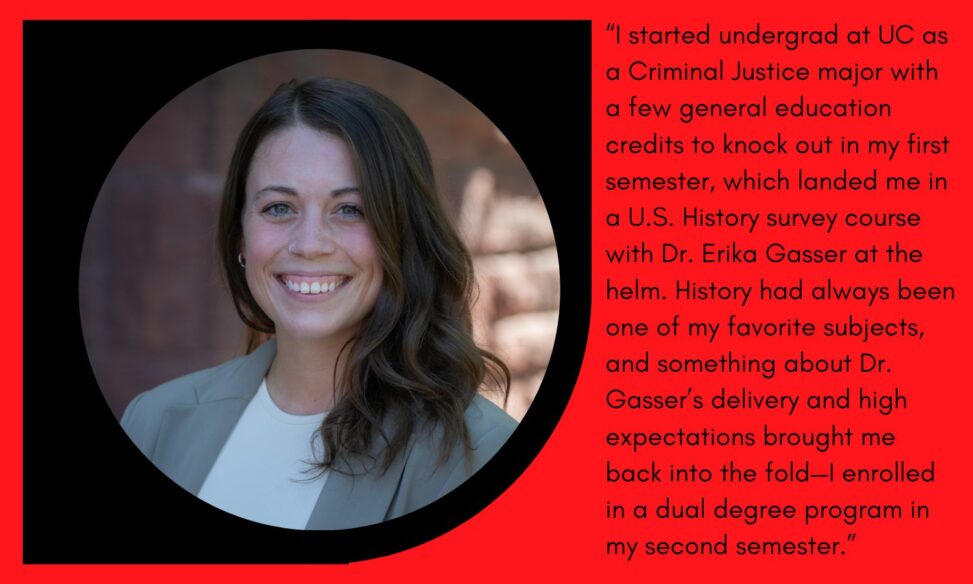I graduated from UC in 2016 with a BA in History, a BS in Criminal Justice, and a Minor in Arabic Language and Culture. Since undergrad, I have earned a Master of Science in Secondary Mathematics and Special Education from Johns Hopkins University. I have since been privileged to teach middle school students in Dallas, Texas, and Denver, Colorado—where I now reside!
What are you up to these days?
After spending the last seven years working in K-12, I recently pivoted to Higher Education. I now work as a Teaching and Learning Specialist at the University of Denver; my focus here is faculty observations and promoting best teaching practices within graduate and undergraduate programs. I will also start my adjunct instructor journey with the University of Denver in the coming months!
What brought you to history at UC?
I started undergrad at UC as a Criminal Justice major with a few general education credits to knock out in my first semester, which landed me in a U.S. History survey course with Dr. Erika Gasser at the helm. History had always been one of my favorite subjects, and something about Dr. Gasser’s delivery and high expectations brought me back into the fold—I enrolled in a dual degree program in my second semester.
What did you focus on as a history student at UC?
I didn’t necessarily have an established or intentional focus while working through my history degree. Looking back, it seems I strongly gravitated toward courses that navigated gender and sexuality across history and cultures.
Did you have any favorite history courses? Which ones and why?
Two courses come to mind!
The first course is Dr. David Stradling’s Making the Metropolis. This course was co-sponsored by the University Honors Program and used Cincinnati as a touchpoint for the complex history of cities and urban development. Professor Stradling took us into the city to explore specific neighborhoods and parks, giving us tangible examples of the theories and stories we explored in the classroom. The course made Cincinnati come to life for me and allowed me to apply Criminal Justice concepts in a space dedicated to History.
The second course that comes to mind is Dr. Gasser’s Gender in Britain and North America 1600-1850. There were no field trips associated with this course, but the intentionality and expertise of Dr. Gasser made the content riveting. Readings weren’t a chore—they were exciting—and helped provide context to some of the gender norms and expectations that persist in modern history.
What did you focus on for your capstone?
My capstone, “Birth Control Death Plan!” How the Black Woman’s Use of the Pill Turned into the Black Man’s Fear of ‘Genocide,’” focused on Black women’s use of birth control in the late 1960s and early 1970s. The paper explored the agency of Black women at a time when the pill was a new form of contraceptive when the government was unjustly regulating the fertility of minorities, and when Black Nationalist movements saw any family planning as a way to stifle the cause. It was a tragic but fascinating topic to cover, and I was glad to have the opportunity to explore so many primary sources throughout the process. I won the George Newberger Award from the History Department for my capstone as well!
What skills did you pick up from studying history that have served you well beyond your courses?
Studying history develops research and writing skills that are transferable to many career fields and graduate degrees. Less tangibly, studying history develops critical thinking and analysis skills in ways that are often untouched by other programs. The need to consider place, time, culture, and perspective when dissecting a source; the need to compare recollections and retellings to find even a modicum of fact; and the need to analyze the events and patterns of the past and how they show through in the present are not futile exercises of the mind and are essential to the study of history. These skills provide another lens to consider and see the world through.
Have any advice for current students?
Take advantage of the resources and relationships provided to you by the History Department, the College of Arts & Sciences, and the University at large. There are so many experiences to be had and ways to be involved that will open doors for you that you never knew existed.

Leave a Reply